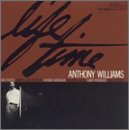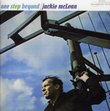| All Artists: Tony Williams Title: Life Time Members Wishing: 0 Total Copies: 0 Label: Capitol Release Date: 10/25/1990 Genre: Jazz Styles: Modern Postbebop, Bebop Number of Discs: 1 SwapaCD Credits: 1 UPC: 077778418023 |
Search - Tony Williams :: Life Time
 | Tony Williams Life Time Genre: Jazz
Tony Williams was just 18 years old when he recorded this, his 1964 debut as a leader, but he was already a prodigious drummer who could maintain a rapid-fire flow of subtle accents that prodded a soloist into fresh direct... more » |
Larger Image |
CD DetailsSynopsis
Amazon.com Tony Williams was just 18 years old when he recorded this, his 1964 debut as a leader, but he was already a prodigious drummer who could maintain a rapid-fire flow of subtle accents that prodded a soloist into fresh directions. His effect on a band was electric, and he had rapidly moved to the front ranks of jazz musicians, working with Jackie McLean, Eric Dolphy, and Miles Davis. More than a fine drummer, Williams was a musical visionary, and with Life Time he recorded one of the most forward-looking of the Blue Note albums of the '60s. It shows in the choice of radical sidemen like Sam Rivers, the explosive tenor saxophonist who had been Williams's early mentor in Boston, and bassist Gary Peacock, then a regular associate of Albert Ayler, as well as the more innovative members of the Blue Note stable, like Herbie Hancock and Bobby Hutcherson. It also shows in Williams's liberating approach to instrumentation, using two basses on some tracks and none on another, and even omitting his own drums from the flamenco-tinged "Barb's Song to the Wizard." The trio of Williams, Rivers, and Peacock create a masterpiece on "Tomorrow Afternoon," with its heady mix of calm and passion, but every track is well-crafted, challenging music. --Stuart Broomer Similar CDs
|
CD ReviewsA stunning debut. Michael Stack | North Chelmsford, MA USA | 11/15/2005 (5 out of 5 stars) "In 1964, 18 year old Tony Williams was on his way up. Acknowledged as one of the most capable drummers on the jazz scene and part of Miles Davis' band, Williams received his first sessions as a leader. Titling the album "Lifetime", the music is drawn from two sessions in August.
For the first session, Williams brought in tenor saxophonist Sam Rivers, who he had worked with in Boston for what would be the tenor's first studio date and bassists Richard Davis and Gary Peacock on a session that would lodge Williams firmly in the avant-garde. The band performs three Williams compositions-- "Two Pieces of One: Red", "Two Pieces of One: Green" and "Tomorrow Afternoon". The two "Two Pieces of One" could scarcely be more different from each other-- 'Red' relies on moody theme statements with tenor doubled by arco basses and some brilliant bass soloing (including an arco/pizzicato dialog at the close of the piece). 'Green' is a feature primarily for Rivers-- the young leader and the tenor duet for several minutes before the performance turns over to a drum solo and then a quartet performance, all filled with far more frantic energy than 'Red'. "Tomorrow Afternoon" finds Williams working in a trio, with Richard Davis sitting out. The theme is a bit more straightforward but the performance finds Rivers exploring as far out as possible with the rhythmically loose Peacock and Williams behind him. One thing is consistent on these three pieces-- the performances are full of fire, energy and inventiveness. The second session yielded two performances by two different groups. "Memory", performed by Bobby Hutcherson (on vibes and marimba), Herbie Hancock (at the piano) and Williams is sparse and minimalist in its arrangement, opening with a delicate marimba line and Williams on maracas and wood block before Hutcherson switches to vibes and Williams to the drum kit. The piece then begins to pick up in tempo and energy, yet remains remarkably loose. Even when Hancock joins, the piece never gets locked down and maintains a distinct freeness. The closer, 'Barb's Song ot the Wizard", was composed by Williams but is performed as a duet between Hancock and bassist Ron Carter. Again, the performance is minimalist, with Hancock laying down a simple rhythmic line and Carter soloing frantically on top of it. A quick note-- this is not to be confused with The Tony Williams Lifetime, generally regarded as the first fusion band (and also a worthwhile listen). This reissue features fantastically improved sound, remastered as part of the "Rudy Van Gelder Edition" reissues, it sounds great, like it was recorded last year instead of in the '60s. The original liner notes are reproduced as well as a new essay by Bob Blumenthal examining the pieces. Williams would go on to explore many venues of jazz, but this album really stands out as his excursion deep into the free jazz sounds he loved. The performances are top-notch throughout and the album stands well over time. Highly recommended." |

 Track Listings (5) - Disc #1
Track Listings (5) - Disc #1